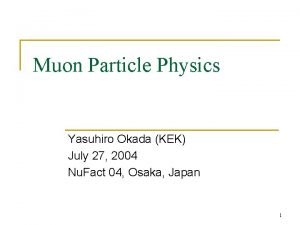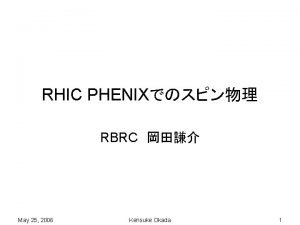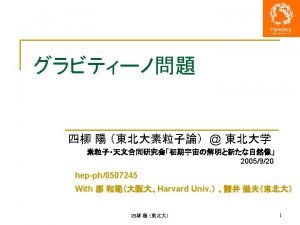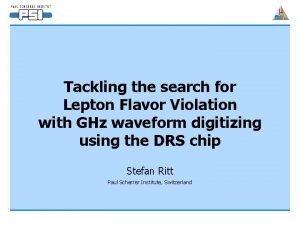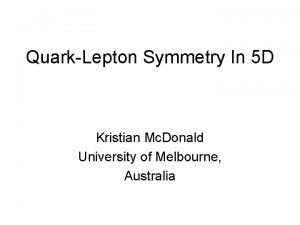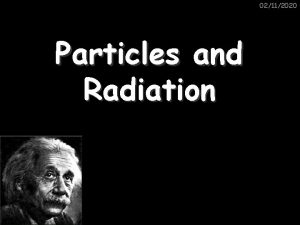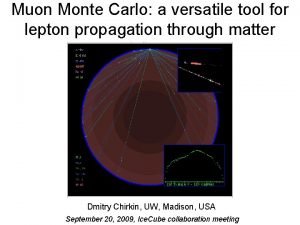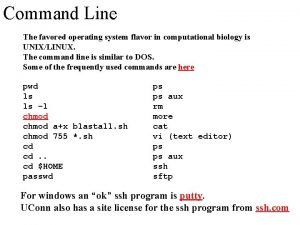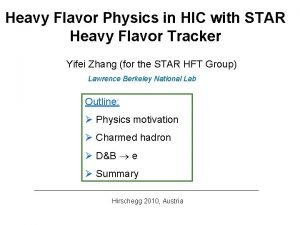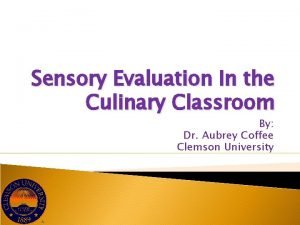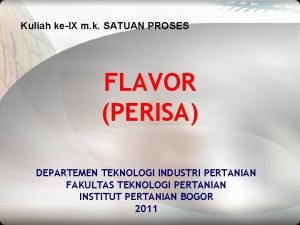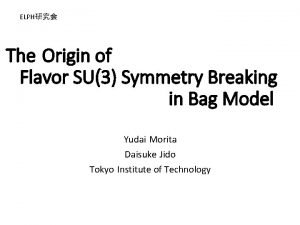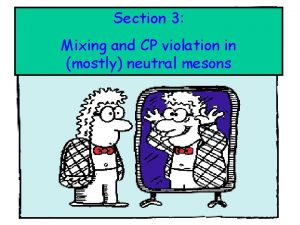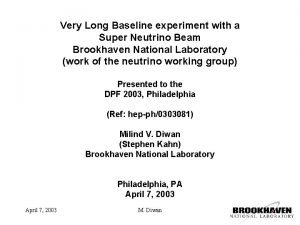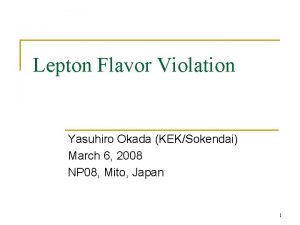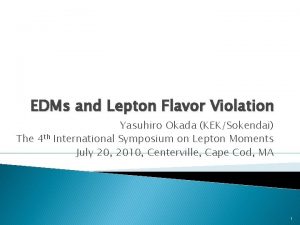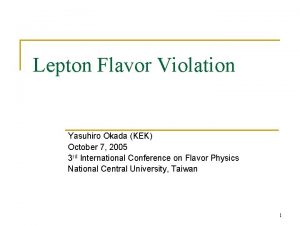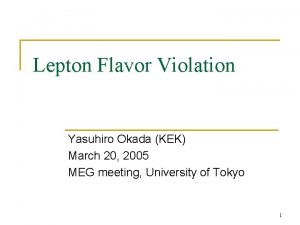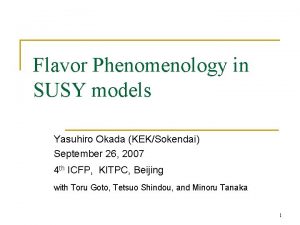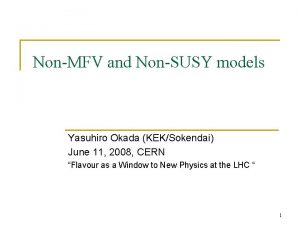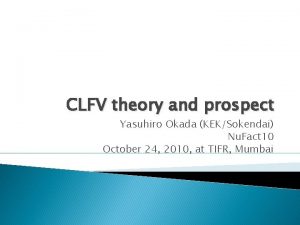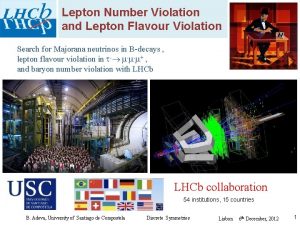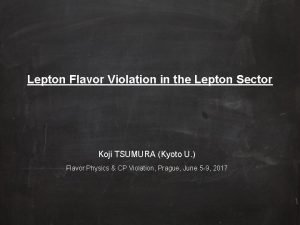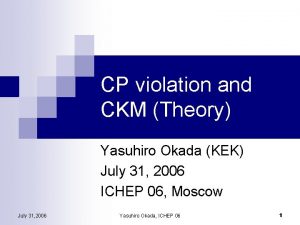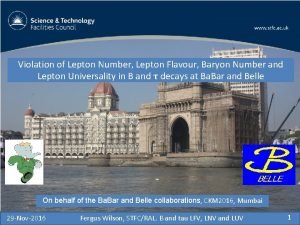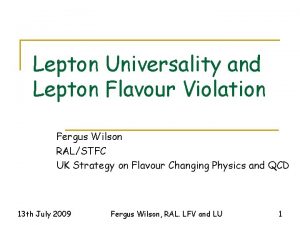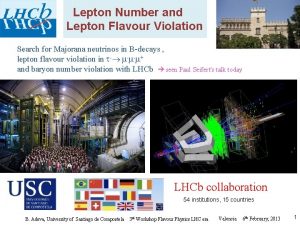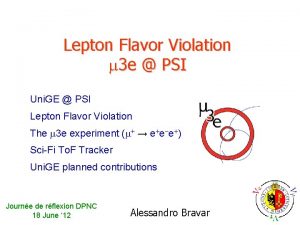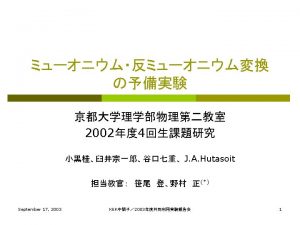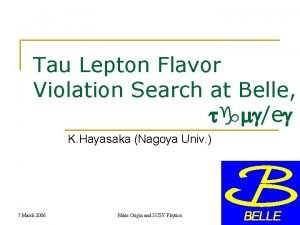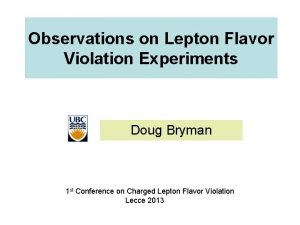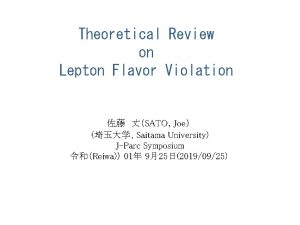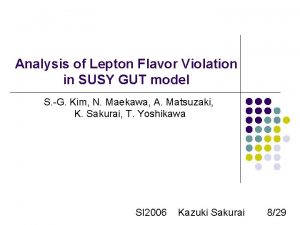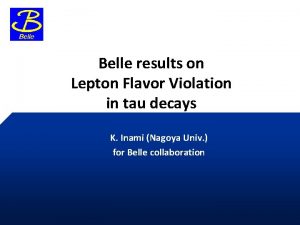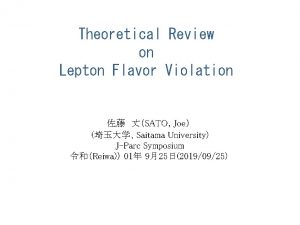Lepton Flavor Violation 2 nd Yasuhiro Okada KEKSokendai







































- Slides: 39

Lepton Flavor Violation 2 nd Yasuhiro Okada (KEK/Sokendai) International Neutrino Summer School August 27, 2010, Yokohama 1

Lepton Flavor Violation (LFV) muon number -1 electron number 0 total lepton number -1 0 -1 -1 Lepton numbers of each generation is not conserved although the total lepton number is a conserved quantity. 2

LFV in the LHC era � LHC experiments start to explore the physics at the Te. V scale. Something new must exist behind the electroweak symmetry breaking. � Lepton Flavor Violation (LFV) in the charged lepton sector is one way to look for effects from new physics at the Te. V scale. � Connection to neutrino mass generation is important. Large LFV is expected for neutrino masses from low scale or supersymmetric models. 3

Contests � History of LFV � Phenomenology of LFV processes � LFV in new physics models 4

Moun: an unexpected particle � Discovery of neutrons (J. Chadwick, 1932) � Prediction of Yukawa meson( H. Yukawa, 1935) � Discovery of muons in cosmic rays (S. H. Neddermeyer and C. D. Anderson, 1937) Muons turned out to be different from the Yukawa meson intermediating the nuclear force. � Discovery of pions (C. Powell, et. al. 1947) 5

Particle physics in late 1940’s “Strong” “Electromagnetic” p p n e g m “Who ordered that? ” (I. I. Rabi) “Weak” n 6

LFV searches � Muon LFV search started from early days of muon experiments. � Absence of m->eg indicates that the muon is not an excited state of the electron, but rather a new elementary particle. 7

m->eg in the intermediate boson model G. Feinberg, “ 1957” If the weak interaction is mediated by the W boson, m->e g should be 0(10 -4) for the model with one species of neutrinos. 8

Two neutrino experiment at BNL A neutrino beam from pion decays only produces muons. X O The muon neutrino and the electron neutrino are different particles 9

The news from the BNL experiment gave an impact to the Japanese theory community. Baryon-lepton correspondence => four quark model The Kobayashi. Maskawa paper on CP violation in 1973 Neutrino mixing 10

In the Standard Model of the elementary particle physics formulated in early 1970’s, lepton flavor conservation is a natural consequence of massless neutrinos. V: Cabbibo-Kobayashi-Maskawa matrix V can be rotated away if all three neutrinos are massless. 11

Neutrino oscillation has established since 1990’s, which leads to renewed interest to LFV in charged lepton sector. The separate conservation of the lepton number for each generation seems to be violated. In the Dirac neutrino, ~10 -47 A large suppression in seesaw neutrino models with the Majorana neutrino scale beyond the Te. V scale. This suggests that the LFV in the charged lepton sector is a probe to neutrino mass generation mechanism beyond the simple Dirac or seesaw model. 12

Phenomenology of LFV processes (MEGA) (SINDRUMII) m-e conversion search at 0(10 -16) is planned at COMET(KEK) and Mu 2 e (Fermilab) experiments 13

Effective interactions 6 additional operators Various llqq operators 14

Tau LFV processes Various flavor structures and their CP conjugates Current bounds for tau LFV processes: 10 -7 - 10 -8 from Belle and Ba. Bar. O(10 -9) at e+e- Super B factories. CMS study: B(t->3 m) < 3. 8 x 10 -8 at 30 fb-1 (R. Satinelli and M. Biasini 2002) 15

K. Hayasaka, ICHEP 2010 16

Distinguishing various LFV interactions � Comparison of three muon LFV processes. (m-> eg, m->eee, m-e conversion) � Angular distribution of polarized muon decays in m-> eg, m->eee. � Atomic number dependence of the mu-e conversion rate. 17

(1) Comparison of three branching ratios If the photon penguin process is dominant, there are simple relations among these branching ratios. In many case of SUSY modes, this is true. Other cases: Additional Higgs exchange diagram (SUSY with large tan b) Dominance of tree exchange diagrams (LR symmetric models) Loop-induced but Z-penguin dominance (Little Higgs with Tparity) 18

(2) Muon Polarization • If the muon is polarized, we can define a P-odd asymmetry for m -> e g and T-odd and P-odd asymmetries for m->3 e. These asymmetries are useful to discriminate different models. The SUSY seesaw model Only LFV coupling for the left-handed slepton mixing => 19

m-> 3 e Two P-odd and one T-odd asymmetries P and T-odd asymmetries in minimal SUSY GUT models 20

(3) Atomic number dependence of the mu-e conversion rate for various LFV interactions O. U. Shanker, 1979 A. Czarnecki, W. J. Marciano, K. Melnikov, 1998 R. Kitano, M. Koike, Y. Okada, 2002 • Atomic number dependences for heavier nuclei are different for different types of LFV interactions. “ Finite size effect”, “Relativistic effect” • Main sources of theoretical uncertainty are also different. Photonic dipole Vector Scalar gluonic 21

Atomic number dependence of the mu-e conversion rate for various LFV operators Z-like vector Photonic dipole Higgs-like scalar Al Ti Pb • Maximal in the intermediate nuclei. • Different Z dependence for heavy nuclei. • Large enhancement in the Z-like vector case (neutron-rich for heavy nuclei). V. Cirigliano, R. Kitano, Y. Okada, and P. Tuson, 2009 22

Theoretical uncertainty depends on a type of operators (1) Photonic dipole case: Almost no uncertainty The calculation only depends on the charge distribution in a nucleus, which is precisely known by electron scattering. (2) Vector case: The main uncertainty comes from the neutron density. Little uncertainty for light nuclei. Uncertainty is 5% level for heavy nuclei if the proton scattering data is available (ex. Pb). (3) Scalar case: An addition source of uncertainty is scalar quark densities in a nucleon. The new lattice QCD estimation of strange quark scalar density. H. Ohki et al. (JLQCD) PRD 78, 054502 compared with the previous phenomenological estimate 23

LFV and New Phyiscs � New physics at the Te. V scale can induce sizable LFVs in the charged lepton sector if there is a source of flavor transition in the lepton sector. � Relationship between physics of neutrino mass generation is important. Scale of the Electorweak symmetry breaking Te. V Scale of the origin of neutrino mass n If two scales are well separated, LFVs are suppressed. Seesaw neutrino model 24

If two scales are close, large LFVs are expected. Te. V n Example: Neutrino mass from loop. In supersymmetric models, LFV are expected even if two scales are separated. Te. V SUSY n Existence /absence of LFV is a clue to fundamental problems such as neutrino mass generation 。 25

New physics examples � In order to discriminate theoretical models , comparison of various signals is important. � SUSY Seesaw with/without SU(5) GUT model � The Littlest Higgs Model with T parity � Neutrino mass from Te. V physics and LFV 26

SUSY is special � SUSY is an extension of relativity (Super. Poincare algebra) � A flame work connecting the electroweak and the Planck scales. Relativity SUSY particle anti-particle ordinary particle SUSY partner CPV possible SUSY breaking possible • If SUSY exist, existence of elementary scalar particles is a built-in property of theory. • The electroweak scale is derived from the SUSY breaking scale. 27

In SUSY GUT, for example, many area of particle physics is related to each other Energy frontier LHC, LC slepton search Muon g-2 squark search Quark flavor physics Bd Bs K charm squark CPV muon physics SUSY GUT Neutrino physics e, mu, n EDM LFV Proton decay Combining all information we may be able to answer questions like Unification, Neutrino mass, Baryogenesis, and Dark matter. 28

SUSY and Flavor Physics SUSY modes introduce SUSY partners. � � � Squark/sleption mass matrixes are new sources of flavor mixing and CP violation. LHC can find squrks/gluino up to 2 -3 Te. V. Super partners SM particles quark Spin 1/2 Spin 0 lepton gluon W, Z, g, H Spin 1 Spin 0 squark slepton Spin 1/2 gluino Spin 1/2 neutralino, chargino Quark mass Squark mass SUSY breaking 29

Slepton flavor mixing In SUSY models, LFV processes are induced by the off-diagonal terms in the slepton mass matrixes g-2: the diagonal term EDM: complex phases LFV: the off-diagonal term Off-diagonal terms depend on how SUSY breaking is generated and what kinds of LFV interactions exist at the GUT scale. 30

SUSY GUT and SUSY Seesaw model Quark and neutrino Yukawa couplings are sources of squark and slepton flavor mixings. � There are many new sources of new CP violation. (Universal SUSY breaking terms, GUT and/or neutrino Yukawa coupling constants) � Quark FCNC m. SUGRA Quark Yukawa coupling Yq GUT LFV Yn Neutrino seesaw model Flavor univesrality of SUSY breaking terms at the cutoff scale Neutrino Yukawa coupling L. J. Hall, V. Kostelecky, S. Raby, 1986; A. Masiero, F. Borzumati, 1986 31

m -> e g branching ratio (typical example) SUSY seesaw model J. Hisano and D. Nomura, 2000 SU(5) and SO(10) SUSY GUT K. Okumura SO(10) SU(5) Right-handed selectron mass The branching ratio can be large in particular for SO(10) SUSY GUT model. Right-handed neutrino mass 32

m-> eg, t->mg SUSY Seesaw model SUSY Seesaw +SU(5) GUT t->mg m-> eg t-> eg Slepton mass Neutrino normal hierarchy => Large m->eg Neutrino inversed hierarchy => t->mg is also large T. Goto, Y. Okada, T. Shindou, M. Tanaka, 2008 33

Higgs exchange contribution in SUSY seesaw model with a large “tanb” m s e s Blue band : Uncertainty from “y” Light: 0<y<0. 4 Dark: 0<y<0. 05 V. Cirigliano, R. Kitano, Y. Okada, and P. Tuson, 2009 34

Little Higgs Model with T parity � The Higgs boson is a pseudo Nambu-Goldstone boson of some strong dynamics at ~10 Te. V. � New gauge bosons and a top partner to stabilize the Higgs potential against large radiative corrections without fine-tuning. � T-odd heavy quarks and leptons are introduced. New flavor mixing matrixes. J. Hubisz, S. J. Lee, G. Paz, 2005 d VHd WH, ZH, AH q. H l VHl l. H WH, ZH, AH New quark and lepton flavor mixing-> Quark FCNC and LFV 35

FCNC and LFV in the Littlest Higgs Model with T-parity “Z-penguin dominated” m->3 e vs. m-eg M. Blanke, et al. 2006 -2009 S. Rai Choudhury, et al. 2007 T. Goto, Y. Okada, Y. Yamamoto, 2009 F. del Aguila, J. I. Illana, M. D. Jenkins, 2009, 2010 m-e conv vs m->eg Different correlation from SUSY case. T. Goto, Y. Okada, Y. Yamamoto, 2010 36

Neutrino mass from Te. V physics and LFV � � If the origin of neutrino mass comes from Te. V physics, a large LFV is expected. Each model shows a characteristic feature in branching ratios, angular distributions, etc. Examples Radiative neutrino mass generation (Zee model, etc) Neutrino mass in the warped extra dimension R-parity violating SUSY model Triplet Higgs model Left-right symmetric model m->3 e m ->eg m-e conv H++ 37

Triplet Higgs model N. Kakizaki, Y. Ogura, F. Shima, 2003 Left-Right symmetric model A(m->eee) m->eg and m->3 e asymmetries V. Cirigliano, A. Kurylov, M. J. Ramsey-Musolf, P. Vogel, 2004 A. Akeroyd, M. Aoki and Y. Okada, 2006 38

Summary � LFV processes are important probes to New Physics at the Te. V scale. � Well-motivated models like SUSY, Little Higgs models, and neutrino mass generation from Te. V physics predict interesting range of signals. � Correlations among various signals including angular distribution of m->eg and m->3 e and atomic number dependence of m-e conversion rates are useful in discriminating different theoretical models. 39
 Yasuhiro okada
Yasuhiro okada Centro de pesquisa mokiti okada
Centro de pesquisa mokiti okada May 25 2006
May 25 2006 Vida no sitio
Vida no sitio Lepton-photon
Lepton-photon Lepton daisy
Lepton daisy Neutrino lepton number
Neutrino lepton number Quark lepton symmetry
Quark lepton symmetry Emission spectrum of sodium
Emission spectrum of sodium Lepton tool
Lepton tool Komponen non gizi jenis zat warna dan flavor terdiri dari
Komponen non gizi jenis zat warna dan flavor terdiri dari Operating system flavor
Operating system flavor Contoh flavor alami
Contoh flavor alami Heavy flavor physics
Heavy flavor physics Pengertian penyedap rasa
Pengertian penyedap rasa Taste vs flavor
Taste vs flavor Flavor pyramid
Flavor pyramid Cocktail flavor wheel
Cocktail flavor wheel Off flavor
Off flavor Contoh flavor sintetis
Contoh flavor sintetis Examples of umami flavor
Examples of umami flavor Su(3) flavor symmetry
Su(3) flavor symmetry Atom palm hydrogen
Atom palm hydrogen Komponen non pangan
Komponen non pangan Fema
Fema Foodstuffs aroma
Foodstuffs aroma Mc flavor fries
Mc flavor fries Does salt lose its flavor
Does salt lose its flavor Traffic control violation sap
Traffic control violation sap Cp-violation
Cp-violation Cp-violation
Cp-violation The recognized violation of cultural norms
The recognized violation of cultural norms Ferpa violations
Ferpa violations Port security violation
Port security violation Apc violation sophos
Apc violation sophos What was the sussex pledge
What was the sussex pledge Danielle's law story
Danielle's law story Mosaic plagiarism definition
Mosaic plagiarism definition Ra9003
Ra9003 Connecticut judicial branch
Connecticut judicial branch
